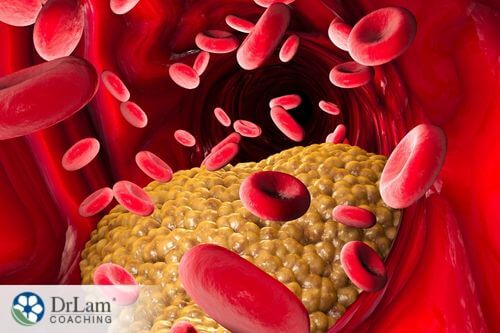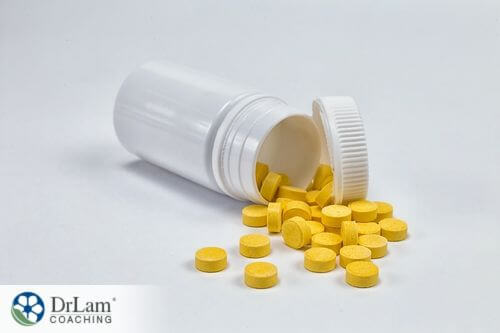Nattokinase was discovered in the 1980s by Dr. Hiroyuki Sumi, a researcher at the Chicago University Medical School. It’s a protease enzyme that is thought to limit cardiovascular events and prevent thrombus formation and blood clotting. Another benefit is its potential to ameliorate pain and inflammation through anti-inflammatory activities. Furthermore, the enzyme may also prove beneficial in helping to remedy other health issues as well. Here's what you need to know if you're considering using nattokinase for heart health.
 Nattokinase is an enzyme that is extracted from natto, a sticky food made from fermented soybeans. It's made with boiled soybeans fermented with the bacterium Bacillus subtilis natto. Natto is a traditional Asian food that is popular in Japan. And it has been used for ages in folk medicine to address cardiovascular diseases.
Nattokinase is an enzyme that is extracted from natto, a sticky food made from fermented soybeans. It's made with boiled soybeans fermented with the bacterium Bacillus subtilis natto. Natto is a traditional Asian food that is popular in Japan. And it has been used for ages in folk medicine to address cardiovascular diseases.
Natto was found to dissolve plasmin substrate as well as artificial fibrin, which is an insoluble protein that’s involved in forming blood clots.
Nattokinase appears to possess the same properties that can help to mitigate specific health issues related to the heart and circulatory system. This enzyme belongs to the serine protease family and is responsible for breaking down other forms of proteins.
Research findings shed some light on the mechanisms of action delivered by nattokinase. This research shows that it can:
Nattokinase is a subject of growing research in the western world because of its recently uncovered potential benefits. It possesses several favorable cardiovascular effects due to its anticoagulant and thrombolytic activities. Some conditions research suggests nattokinase may help include:
Nattokinase may be beneficial for patients with thrombosis, which is the development of a blood clot inside a blood vessel. Specifically, it dissolves fibrin and minimizes levels of coagulation factors involved in blood clotting. It appears that a high dose of nattokinase can be an effective anti-clotting agent, reducing blood clots and possibly preventing their formation altogether. In this way, it mimics the effects of aspirin, a popular blood thinner. Nattokinase is effective in improving blood flow to normal levels as well.
A blood clot in a deep vein in a person’s body is called a deep vein thrombosis (DVT). It commonly occurs in the legs and usually affects older or obese individuals who suffer from an underlying circulatory problem. Research has shown that nattokinase can break down fibrin and act as a potent anticoagulant (blood thinner), limiting the concentration of factor VIII, a blood-clotting protein.
According to a study in the International Journal of Molecular Science, in which a group of twelve healthy, young males were randomly given a single capsule of nattokinase (2000 FU), in just two hours, the antithrombin concentration in their blood increased significantly. The findings suggest that it protects against deep vein thrombosis by improving blood flow and preventing blood clot formation.
 Nattokinase may also ameliorate and slow the progression of atherosclerosis. This condition involves the hardening of arteries, which is due to the accumulation of fatty plaques on the arterial walls. The impact of this enzyme on atherosclerosis is attributed to its antioxidant properties.
Nattokinase may also ameliorate and slow the progression of atherosclerosis. This condition involves the hardening of arteries, which is due to the accumulation of fatty plaques on the arterial walls. The impact of this enzyme on atherosclerosis is attributed to its antioxidant properties.
A recent study that assessed atherosclerosis amelioration of nattokinase compared to simvastatin (a common lipid-lowering statin medication) found that nattokinase outperformed simvastatin with a 14.8% greater reduction in arterial plaque. It also improved the level of "good" HDL cholesterol in the body and simvastatin did not. However, nattokinase was less effective than simvastatin in minimizing total cholesterol, "bad" LDL cholesterol, and triglycerides. These parameters are major factors for cardiovascular disease.
These findings help with understanding the greatest benefits of nattokinase and where it lacks compared to other remedies for atherosclerosis.
There is some evidence that suggests that nattokinase may possess neuroprotective and antiapoptotic properties that stops the progression of ischemic stroke in sufferers. Apoptosis is cell die-off, so by preventing cell die-off, nattokinase may help limit the effects of a stroke.
Nattokinase may also improve blood flow to the brain after a stroke by breaking down fibrin and minimizing the spread of tissue damage. Furthermore, the protein enzyme is believed to have the potential to reduce the von Willebrand Factor (vWF), which is a mediator that increases the risk of forming clots, and as a result, increases the risk of stroke.
Additionally, nattokinase is purported to help conditions including:
If you have systemic inflammation, this puts you at higher risk for coagulation abnormalities, like thrombosis, which in turn increases inflammation. As an anti-thrombotic agent, nattokinase has anti-inflammatory and anti-oxidative stress functions. It helps maintain healthy levels of C-reactive protein, which is an inflammation marker and a risk factor for heart disease. Inflammation and oxidative stress are key players that cause inflammation. Nattokinase restrains this activity.
It breaks the vicious cycle between inflammation, oxidative stress, and thrombosis by ameliorating LPS-activated macrophage, which is an immune system cell signaling and protecting against LPS-stimulated proinflammatory cytokine release and blood clots. In other words, it prevents the expression of pro-inflammatory mediators, which helps to keep inflammation and pain at bay.
Chronic inflammation and Adrenal Fatigue Syndrome(AFS) are closely linked. Inflammation is a contributing factor to the condition, and it is also a trigger for AFS symptoms. AFS is caused by chronic stress and results in the overuse of the NeuroEndoMetabolic (NEM) stress response. This response results in high cortisol levels and creates inflammation in response to emotional or physical stress. Stress activates the Cardionomic circuit, which is composed of the adrenal glands, the autonomic nervous system (ANS), and the cardiovascular system (CVS).
The Inflammation Circuit, which is regulated by the immune system, gastrointestinal tract, and microbiome, becomes dysregulated or imbalanced when stress triggers inflammation. Nattokinase appears to have the potential to positively impact the Inflammation Circuit and control inflammation by preventing pro-inflammatory activities in the body. This could help with remedying AFS symptoms.
 When it comes to dosage, it’s difficult to arrive at a safe and effective dosage recommendation because more research is needed. There is no universal dosage guideline to follow. However, based on multiple clinical studies that have demonstrated beneficial results using various doses, there are a number of suggestions associated with particular conditions.
When it comes to dosage, it’s difficult to arrive at a safe and effective dosage recommendation because more research is needed. There is no universal dosage guideline to follow. However, based on multiple clinical studies that have demonstrated beneficial results using various doses, there are a number of suggestions associated with particular conditions.
In the US, nattokinase is sold exclusively in capsule or tablet form. Its activity is measured in fibrin units. Also, it’s recommended that nattokinase is taken on an empty stomach or between meals.
What has been observed in terms of dosage includes:
It’s best to talk to your doctor before taking any new medication or supplement.
Nattokinase's effectiveness can be enhanced when combined with certain products. Here are a few examples:
The combination of nattokinase and red yeast rice has the potential to minimize cholesterol with greater efficacy than if nattokinase were to be administered as a single remedy. Nattokinase was observed in a clinical trial to be effective at reducing blood cholesterol and triglyceride levels after a period of time. However, when the enzyme was combined with red yeast rice, reduced levels of LDL, total cholesterol, and triglycerides, and increased HDL occurred earlier in therapy and continued throughout the therapy.
Serrapeptase is another form of proteolytic enzyme that comes from silkworms. It improves the efficacy of nattokinase by also helping with inflammation, circulation, and cardiovascular benefits.
However, the lack of evidence to support nattokinase makes it smart to avoid taking it without the advice of your doctor. The problem is that, if you choose to combine it and other supplements, you may experience unexpected interactions.
Nattokinase binds to heparin, which is an anticoagulant drug. The length of the heparin chain is a factor in determining if nattokinase can interfere with heparin’s functions.
It’s best not to mix nattokinase with other blood-thinning agents like aspirin. It has the potential to thin the blood. This could lead to serious health complications, such as bleeding in the brain.
So far, human trials haven’t revealed any adverse side effects. Thus, it is generally safe to use the enzyme. However, there is still the need to create a safety profile for nattokinase since it can impact blood flow.
In the meantime, be mindful of these nattokinase-associated concerns, including:
Consult with your doctor before supplementing with nattokinase to avoid the occurrence of adverse effects and unfavorable interactions.
 Nattokinase is beneficial in helping to ameliorate cardiovascular issues. It helps by dissolving blood clots, helping to protect against stroke, improving cholesterol, and slowing the progression of atherosclerosis. However, it may interact with blood thinners, so talk to your doctor if you are considering using this supplement.
Nattokinase is beneficial in helping to ameliorate cardiovascular issues. It helps by dissolving blood clots, helping to protect against stroke, improving cholesterol, and slowing the progression of atherosclerosis. However, it may interact with blood thinners, so talk to your doctor if you are considering using this supplement.
If you are concerned about cardiovascular risks and would like assistance in determining natural ways to prevent them, the team at Dr. Lam Coaching can help. We offer a free** no-obligation phone consultation at +1 (626) 571-1234 where we will privately discuss your symptoms and various options. You can also send us a question through our Ask The Doctor system by clicking here.
Nattokinase is a protease enzyme that is derived from natto, a fermented soybean product. It limits cardiovascular events by preventing thrombus formation and blood clotting. It dissolves plasmin substrate as well as artificial fibrin, an insoluble protein that’s involved in forming blood clots. It also appears to help lower cholesterol levels.
